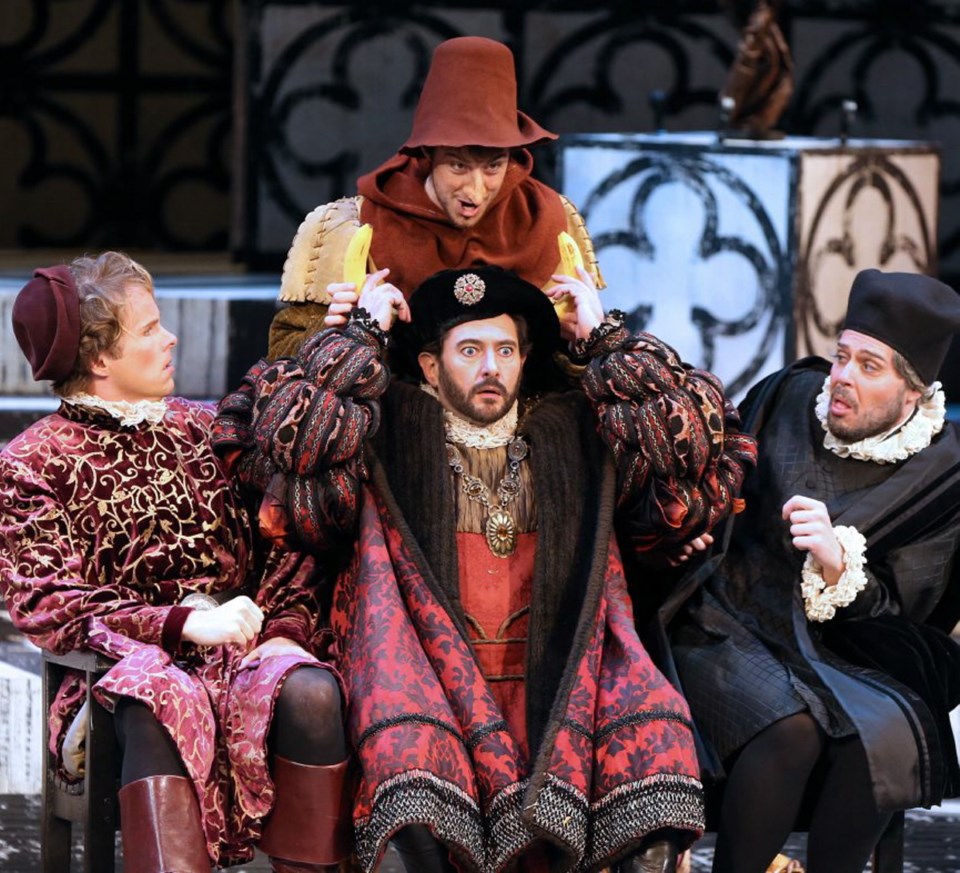REVIEW
What: Pacific Opera Victoria: Verdi’s Falstaff
Where: Royal Theatre
When: Tonight, Oct. 23, and 25, 8 p.m.; matinee Oct. 27, 2:30 p.m. Pre-performance lecture one hour before showtime
Tickets: $40 to $135 at rmts.bc.ca and 250-386-6121. Student rush tickets $15 at the door 45 minutes prior to each performance, subject to availability
Pacific Opera Victoria launched its 2013-14 season Thursday evening with a performance of Verdi’s Falstaff that earned a tumultuous ovation. POV has never mounted this masterpiece before, though the performance was noteworthy for another reason, too: It marked the opening of POV’s 100th production.
The company is justly proud of this milestone and could not have selected a more exquisite score with which to celebrate it. Adapted from Shakespeare and first performed in 1893, Falstaff is a virtuosic, almost impossibly rich display of both craftsmanship and imagination, yet, remarkably, Verdi was in his late 70s when he wrote it and had not turned his hand to comedy for more than 50 years.
POV’s production brings the work vividly to life, as both music and theatre. The Victoria Symphony sounds tight and articulate, with an appropriately light touch, under the baton of POV’s artistic director, Timothy Vernon — an impressive feat in this quicksilver, subtle score, which demands an uncommon degree of alertness and concentration from an orchestra. Whether the context is comic or lyric, the pit sparkles with colour and nuance, though the accompaniments are rendered so sensitively that the voices are always intelligible.
POV has assembled no better group of singers in recent memory; indeed, this cast counts as something of a company highlight reel, with Scottish bass Brian Bannatyne-Scott (magnificent in Strauss’s Capriccio in 2010) returning to join a handful of outstanding, established Canadian singers who have all done memorable work for POV.
Bannatyne-Scott, as Falstaff, is impressively versatile: He is one of those big men who can use his size to impress or intimidate or command but can be surprisingly light-footed and delicate, too; he makes us understand why people might be charmed by and forgiving of this old rogue.
His vocal range matches his physical range, including magnificent bellows of self-adoration and dudgeon to funny falsetto and quasi-spoken bits.
The internationally celebrated baritone Brett Polegato initially makes Ford such an authoritative character that his later comic transformation comes as a real surprise, and is all the more delightful, while in Ford’s great Act 2 solo, the most serious number in the opera, he delivers a real tour de force of dramatic power.
Soprano Joni Henson brings to the role of Alice Ford a voice of tremendous power and depth previously heard here in dramatic roles (Senta, Tosca) but now turned, very skilfully and attractively, to comic purposes. She has two excellent comic partners: mezzo-soprano Mia Lennox-Williams, as the goofy, excitable Meg Page, and mezzo-soprano Megan Latham, as the feisty Mistress Quickly (particularly impressive in her mock-serious Act 2 scene with Falstaff).
Tenor Colin Ainsworth and soprano Rachel Fenlon, with fresh faces and appealing voices, are sweet and personable as the young couple, Fenton and Nanetta. Fenlon, moreover, is one of several Victoria natives here; another of them, tenor Josh Lovell, who plays Bardolfo, is still an undergraduate student, and that is scarcely believable — he seems fully at home among all these distinguished pros.
Glynis Leyshon’s production is funny and fast-moving, brimming with business (that which arises naturally out of character and situation registering better than the outright slapstick). Visually the production (designed by Leslie Frankish) seems cluttered: busy staging, sumptuous period costumes, and various scenic elements (bushes, tree, curtain) are placed in front of a set that is decorated in big, repeated geometrical patterns, like wallpaper, with results that can be cacophonous to the eyes.
A surfeit of visual stimulation is exactly what Falstaff doesn’t need — not with Verdi already supplying a ceaseless outpouring of fresh and brilliant detail for the ears.
No complaints here, though, about the witty cameo appearance Verdi himself makes at the end, during the great closing fugue. It’s a neat, appropriate little envoi to a lively, charming and historically momentous show.



